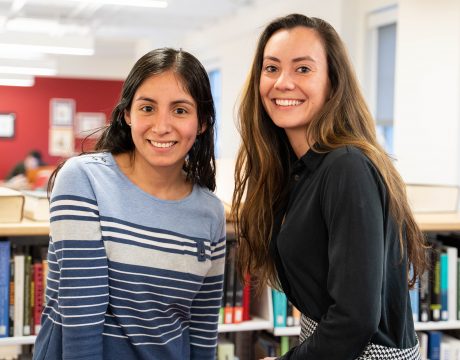Congratulations to first-year Geisel students Priscila Cevallos ’23 and Irene Vargas ’23 for their election to the Executive Council of the Latino Medical Student Association-Northeast (LMSA-NE). New members are elected annually during the NE regional conference, which includes nearly 40 medical schools. Cevallos and Vargas will assume their new positions as Policy Chair, and Service Chair, respectively, early this summer.
Cevallos has a history of working hard to make a difference in her community—as an undergraduate she was extensively involved with the American Medical Student Association (AMSA) and in advocacy work supporting Dell Medical School of the University of Texas at Austin.

“As part of the regional AMSA leadership, I helped organize the AMSA premed members to serve on a variety of committees that would help bring to life the vision of the med school—from admissions to curriculum changes to deciding if the school should move to an iPad-based cadaver lab as opposed to having donors,” she says.
This whet her appetite for advocacy—she followed up with a trip to Washington, D.C. to talk to legislators about expanding the National Health Service Corp Scholarship Program, which she describes as a powerful experience. “So often, and maybe more so for immigrants, you don’t feel as though you have that big of a voice; learning that you do and taking the extra step in talking to people about what you are passionate about is empowering.”
Cevallos plans to build a coalition of Latino medical student advocates within LMSA by organizing policy events at regional meetings and to also organize a national advocacy day on Capitol Hill in Washington to talk to legislators about Latino communities and health issues—underserved populations and immigrant health are important issues for her.
“One of LMSA’s goals is for us to learn new skills, skills that are reflective of the work I will do as a future physician advocating for my patients—whether it’s in your hospital system, with community leaders, or with state legislators—there is an opportunity and a role for advocacy no matter how you end up practicing medicine.
“I’m really excited about this role because it’s going to be a very interesting year politically. I think there will be a lot of things to talk about,” Cevallos says. “One of my goals at Geisel is to get more people involved in healthcare advocacy. I’m taking the healthcare policy elective and can’t wait to see how health policy works in New Hampshire.”
As the conference drew to a close, Cevallos listened to the House of Delegates discuss nominations for various board positions—when the policy position was discussed she impulsively nominated herself.
“Nominating myself felt empowering because I didn’t wait for someone to do it for me or seek anyone’s permission or approval. I was really proud of putting myself out there,” she says.
Vargas, who was born in Peru, came to the U.S. with her family when she was 10 years old. “My family and I used every help we could get from different service organizations—we would go to free clinics to be seen by physicians, medical students, and volunteers. All of these experiences along with my background affect who I am and why I do the things I do,” she says.
While an undergraduate, she was active in her home community of Miami, Florida, then in Baltimore, Maryland, working with immigrants and refugees as a volunteer through Health Leads—a national healthcare organization that connects low-income patients with the basic resources they need to stay healthy—and through her college’s Latino Premedical Honors Society.
“We volunteered as translators and would measure blood pressure at a free health clinic in the community; we would also teach English. There were a lot of young students coming from Latin America as unaccompanied minors to be united with their families in Baltimore and they didn’t speak English,” Vargas says. “We were helping them navigate everything—I reached out to and was involved with other organizations in Baltimore because these families needed a lot of assistance. Every Saturday we helped immigrants and refugees fill out forms for asylum, residency, or citizenship. Many of them had green cards but not citizenship.”
Service Chair is a relatively new position within LMSA, which Vargas says is perfect for her. “For the next LMSA conference, I’m thinking about creating a group service project. Every school does their own service work, but I’m interested in what other schools are doing in relation to the service work in Geisel’s chapter—there may be opportunities to work together.”
Her decision to self-nominate was also spontaneous and she didn’t expect it to result in a win. “I particularly love this position because it will allow me to lead community service efforts to the Latino community and give back to those that need it the most, and I’m really happy that I will have an opportunity to make a difference —LMSA gives you the space to do that, especially when you are a minority. Priscila and I will be able to continue doing something we are both very passionate about.
“Going to the conference was an opportunity to be around other medical students who look like I do and who may have had the same experience growing up—that’s important to me. Being a part of LMSA is powerful.”